
A brief description of LibriVox.org, what it is, why it’s awesome, narrated by Phil Chenevert.
[via LibriVideo]
Posted by Jesse Willis

A brief description of LibriVox.org, what it is, why it’s awesome, narrated by Phil Chenevert.
[via LibriVideo]
Posted by Jesse Willis

 There’s a new great narrator working over on LibriVox and his name is Phil Chenevert.
There’s a new great narrator working over on LibriVox and his name is Phil Chenevert.
Now when I say new I mean new-to-me, Chenevert has, apparently, been active on LibriVox since 2010. Since then he’s recorded an impressive number of audiobooks. I only discovered that after hearing his newly released, pitch perfect, reading of The Man In Asbestos: An Allegory Of The Future by Stephen Leacock (which is just one section of THIS audiobook).
You can check out all of his narrations HERE – based on what he’s recorded so far Chenevert seems to have a fondness towards children’s literature with several whole single narration audiobooks of Lewis Carroll, L. Frank Baum, and the Br’er Rabbit stories (which are awesomely accented) as well as a schooling manual (Dr. Montessori’s Own Handbook by Dr. Maria Montessori). But there are a few SF titles in his catalogue too.
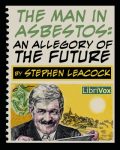 The Man In Asbestos: An Allegory Of The Future
The Man In Asbestos: An Allegory Of The Future
By Stephen Leacock; Read by Phil Chenevert
1 |MP3| – Approx. 27 Minutes [UNABRIDGED]
Publisher: LibriVox.org
Published: April 16, 2012
A 20th century man travels to the distant future by typical means (eating donuts and reading comics) only to find himself in a museum of the 20th century. The museum’s curator isn’t exacty sure if it’s the year 3000 or not, but he is sure that life is better now that nobody dies, eats, or has a telephone. First published in 1911 as a part of Nonsense Novels.
[Thanks also to April Gonzales!]
Posted by Jesse Willis


![]()
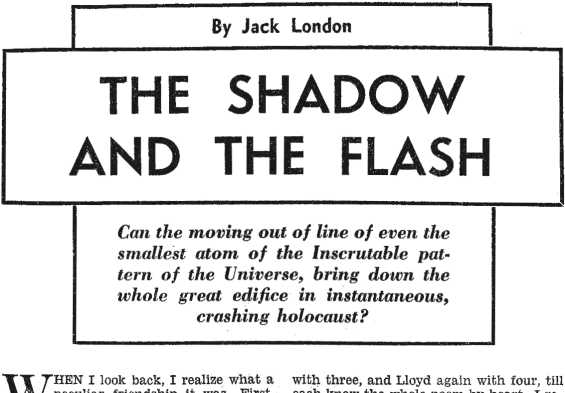
Here’s one of Gregg Margarite’s earliest narrations for LibriVox. Because it was so early it sounds like one of his more amateur recordings – mostly because Gregg reads it too fast. But one thing that didn’t really change, that needed no refinement, his skill at picking stories to record. This Jack London short story is fun Science Fiction. It’s about a pair of nearly identical, ferociously competitive, brothers. The tale was written in 1902, five years after The Invisible Man, by H.G. Wells, was published as a novel.
Indeed, the plot is rather … how shall I put this ? … familiar ? … with the The Invisible Man. But that’s okay as there’s a line aknowledging it by one of the brothers. At least it’s a hat-tip in that direction. But instead of one mad scientist as in Well’s novel, we have two in The Shadow And The Flash – in fact were they a pair of superheroes (or supervillains) that’d be each of their names (The Shadow and The Flash) as they get their powers from the way they approached the problem of invisibility – that is to say from opposite ends, as it were.
It was at about seven minutes in before the story really took off – here’s the part that grabbed me:
Lloyd warmed to the talk in his nervous, jerky fashion, and was soon interrogating the physical properties and possibilities of invisibility. A perfectly black object, he contended, would elude and defy the acutest vision.
“Color is a sensation,” he was saying. “It has no objective reality. Without light, we can see neither colors nor objects themselves. All objects are black in the dark, and in the dark it is impossible to see them. If no light strikes upon them, then no light is flung back from them to the eye, and so we have no vision-evidence of their being.”
“But we see black objects in daylight,” I objected.
“Very true,” he went on warmly. “And that is because they are not perfectly black. Were they perfectly black, absolutely black, as it were, we could not see them—ay, not in the blaze of a thousand suns could we see them! And so I say, with the right pigments, properly compounded, an absolutely black paint could be produced which would render invisible whatever it was applied to.”
“It would be a remarkable discovery,” I said non-committally, for the whole thing seemed too fantastic for aught but speculative purposes.
 The Shadow And The Flash
The Shadow And The Flash
By Jack London; Read by Gregg Margarite
1 |MP3| – Approx. [UNABRIDGED]
Publisher: LibriVox.org
Published: March 12, 2009
A tale about two brothers who take different routes to achieving invisibility, as narrated by their best friend. First published in The Bookman, June 1903. Later published in The Windsor Magazine, October 1904, and in Famous Fantastic Mysteries, June 1948, Leoplan #502 (May 18, 1955).
Here’s The Windsor Magazine edition |PDF|, here’s the Famous Fantastic Mysteries edition |PDF|, and here’s a Spanish translation from Argentina’s Leoplan |PDF|.
Illustrations from The Windsor Magazine publication:




Virgil Finlay’s illustration from Famous Fantastic Mysteries:
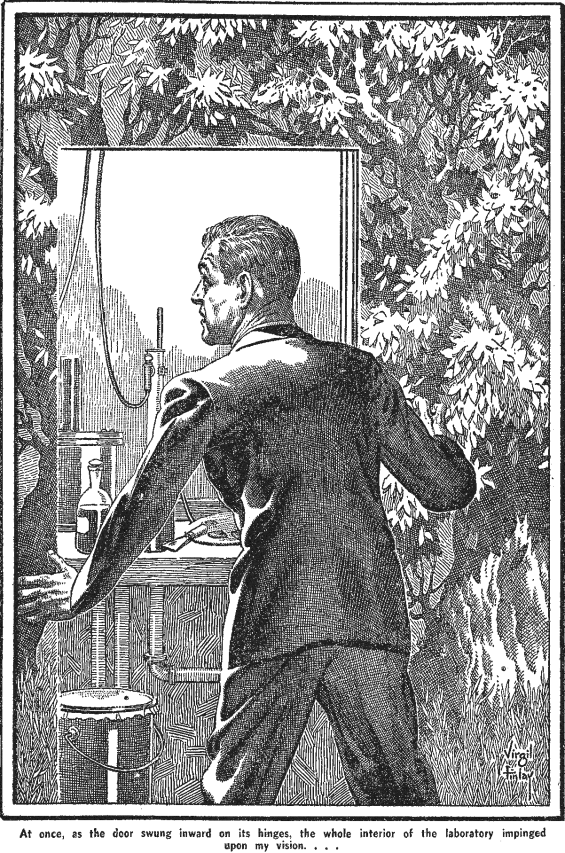
Raul Valencia’s illustrations from LeoPlan 502:
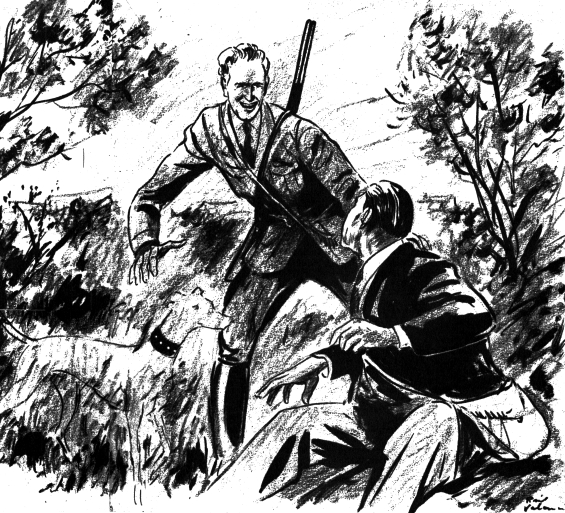
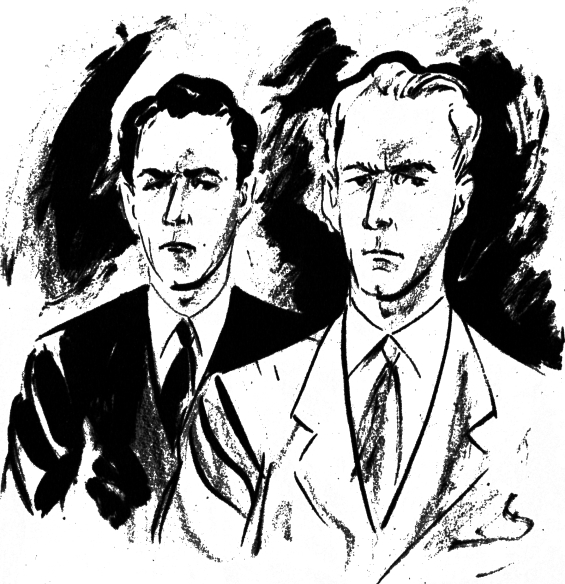
Posted by Jesse Willis



 The SFFaudio Podcast #154 – Scott, Jesse, Tamahome, Mirko and David Stifel talk about An Occurrence At Owl Creek Bridge by Ambrose Bierce (read by Bob Neufeld for LibriVox).
The SFFaudio Podcast #154 – Scott, Jesse, Tamahome, Mirko and David Stifel talk about An Occurrence At Owl Creek Bridge by Ambrose Bierce (read by Bob Neufeld for LibriVox).
Talked about on today’s show:
The Devil’s Dictionary, comic irony, an American classic, German drama, Famous Monsters Of Filmland, Sleep No More, Nelson Almstead, The Twilight Zone, The Outer Limits, One Step Beyond, civil war stories, quantum mechanics, The Damned Thing, the genres: horror, ghost, “weird”, “weird war”, “dream”, or SUSPENSE, alternate reality, why is An Occurrence At Owl Creek Bridge so popular with high-school English teachers?, time perception, not-SF, “the man who was engaged in being hanged”, passivity, “go for it hands”, “a dream story”, David used to have out of body dreams, “stream of consciousness”, subjectivity, Henry James, the radio drama adaptations (Escape, Suspense, CBS Radio Mystery Theater),
“Each year thousands of short stories roll out from a multitude of typewriter, march across the pages of our magazines toward well deserved oblivion. Few are memorable, fewer still are classics. They pass the time and are forgotten even before the paper on which they are written is reduced to black ash. But occasionally a story is written that is a true classic, an unforgettable tale.”
astral projection, H.P. Lovecraft, Accessory Before The Fact by Algernon Blackwood, near death experience, Bierce’s headwound, Sigmund Freud, A Dream Play by August Strindberg, The Horla by Guy de Maupassant, the driftwood, the slowdown of time, it’s a mystery story, a million blades of grass, infinite detail and infinite depth, Isaac Asimov, The Turn Of The Screw, The Twilight Zone version (which was a French short film), what’s with the corporal?, of the body, a hidden pun or joke, it was a setup, a great suspicion of death or dying, the kicking legs = running, unconscious insight result in surprise and relief, the tongue, wish fulfillment, the suspicion begins, naturalistic interpretation, Igor (Son Of Frankenstein), the history of hangings, botched hangings, popping heads, Hang ‘Em High, Braveheart, can it be truly spoiled?, war,
“Death is a dignitary who when he comes announced is to be received with formal manifestations of respect, even by those most familiar with him. In the code of military etiquette silence and fixity are forms of deference.”
constitutional rights, the Alfred Hitchcock Presents adaptation, The Twilight Zone short film version, HuffDuffer, CBS Radio Mystery Theater adaptation, “it’s best read”, an audio drama adaptation, impressionism, mapping back, additional scenes, a water moccasin, narration, is it a miracle that the rope breaks, a heavenly Eden like land, gates, Sergei Bondarchuk’s War And Peace, Leo Tolstoy, altered state, (The Crawling Chaos), sex choking, speculative fiction, life passing before you, the telescoping of time, remembering the classics, 100,000 high school teachers, one of the most podcast short stories, O. Henry stories are cute, an existential story, “trapped in a world he never made”, an exegesis.


Posted by Jesse Willis

Gregg Margarite recorded only one poem for LibriVox.org. I find it highly appropriate. It’s by one of his favourite authors, Jonathan Swift.
Here’s Gregg’s reading of The Logicians Refuted |MP3|.
Posted by Jesse Willis

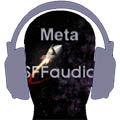 I’ve just heard that Gregg Margarite, my good friend, and a friend to humanity, has died.
I’ve just heard that Gregg Margarite, my good friend, and a friend to humanity, has died.
Here are the facts as I’ve been told them.
Gregg died of a sudden heart attack on Friday morning (March 23, 2012).
__
I’ve never used an emoticon in a post on SFFaudio. Emoticons, I thought, were for when words couldn’t be easily employed. And I figured that was never.
I was wrong.
If there ever was a day for a frowny face that day is this day.
:(
I became a friend of Gregg’s after listening to his recordings on LibriVox. I said to him that I wanted to be his friend because he was narrating so many of the audiobooks that I wanted to listen to. I told him that meant we had to be friends. And he believed me. And so we were.
We did several podcasts with Gregg. All of them were really fun. And, we were planning more. My last communication with him was about Philip K. Dick’s The Short Happy Life Of The Brown Oxford – which he wanted to narrate. Gregg wrote:
“I have 3 holy grails when it comes to PKD short stories, Brown Oxford, Electric Ant (not gonna happen in my lifetime) and Not By Its Cover.”
I was also waiting to hear his thoughts on the first episode of Black Mirror. I know he got it, but I don’t know if he saw it. I guess I’ll never know.
I told Gregg I had started listening to his narration of the novel Couch by Benjamin Parzybok. He asked that I tell him about it after listening. I won’t get that chance now.
Gregg was also planning on narrating The Ganymede Takeover, a novel by Philip K. Dick and Ray Nelson. I don’t think he’d actually started it yet though as I hadn’t yet sent him my copy.
The last update on Gregg’s site says that he’d recorded 205 hours, 58 minutes, and 30 seconds of audiobooks. Most of that was for LibriVox. I figure that’s one hell of a legacy.
In the many times we spoke I learned many surprising things about Gregg. He said he used to build “surrogate penises for Ronald Regan”, he was a musician, he was an artist and he was a fiction writer too (but under pseudonyms). I never learned his pseudonyms.
Gregg’s website, Acoustic Pulp, offers no comments section. So I invite anybody wishing to communicate any kind thoughts with Janine, Gregg’s wife, to comment below.
Update:
Mark Nelson has started a LibriVox forum thread.
Posted by Jesse Willis